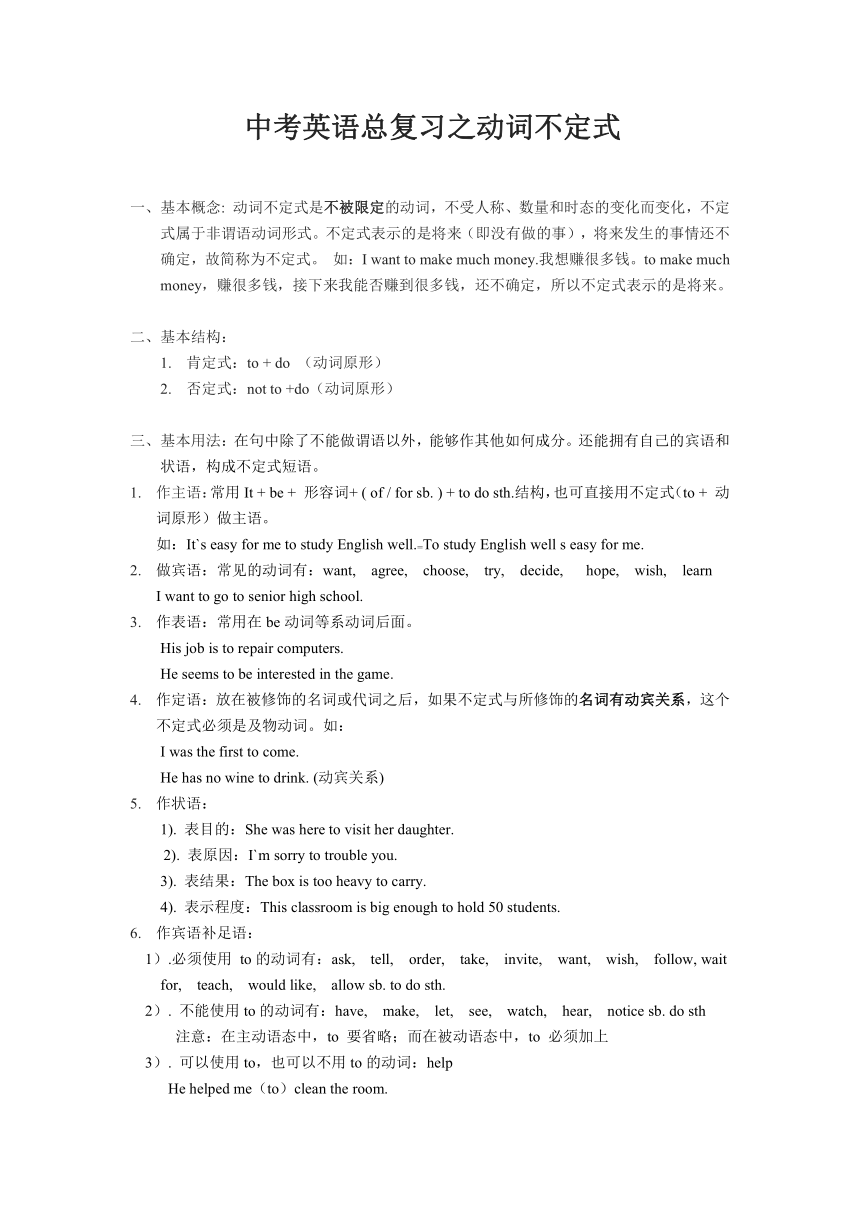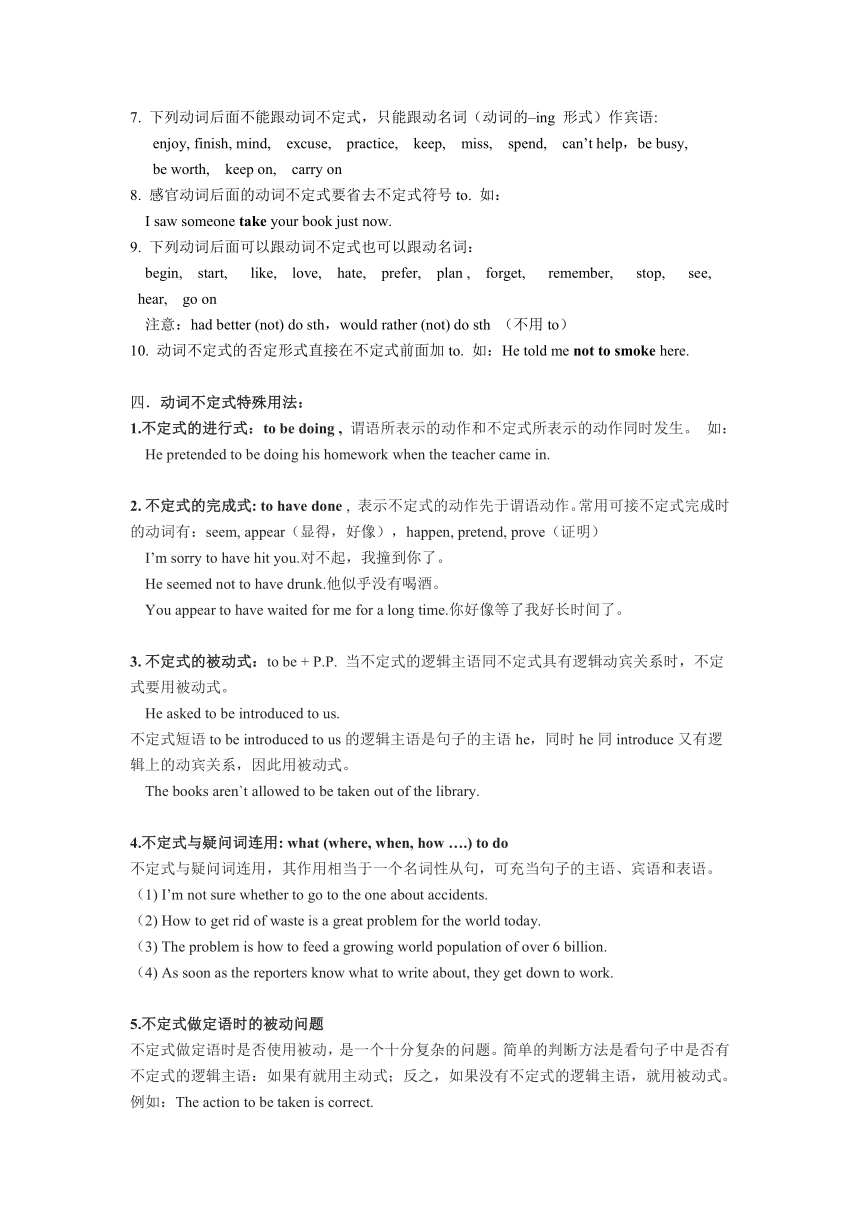2022年中考英语专题总复习之动词不定式及练习(无答案)
文档属性
| 名称 | 2022年中考英语专题总复习之动词不定式及练习(无答案) |

|
|
| 格式 | zip | ||
| 文件大小 | 19.6KB | ||
| 资源类型 | 教案 | ||
| 版本资源 | 人教新目标(Go for it)版 | ||
| 科目 | 英语 | ||
| 更新时间 | 2022-05-24 11:00:51 | ||
图片预览


文档简介
中考英语总复习之动词不定式
基本概念: 动词不定式是不被限定的动词,不受人称、数量和时态的变化而变化,不定式属于非谓语动词形式。不定式表示的是将来(即没有做的事),将来发生的事情还不确定,故简称为不定式。 如:I want to make much money.我想赚很多钱。to make much money,赚很多钱,接下来我能否赚到很多钱,还不确定,所以不定式表示的是将来。
基本结构:
肯定式:to + do (动词原形)
否定式:not to +do(动词原形)
基本用法:在句中除了不能做谓语以外,能够作其他如何成分。还能拥有自己的宾语和状语,构成不定式短语。
作主语:常用It + be + 形容词+ ( of / for sb. ) + to do sth.结构,也可直接用不定式(to + 动词原形)做主语。
如:It`s easy for me to study English well.=To study English well s easy for me.
做宾语:常见的动词有:want, agree, choose, try, decide, hope, wish, learn
I want to go to senior high school.
作表语:常用在be动词等系动词后面。
His job is to repair computers.
He seems to be interested in the game.
作定语:放在被修饰的名词或代词之后,如果不定式与所修饰的名词有动宾关系,这个不定式必须是及物动词。如:
I was the first to come.
He has no wine to drink. (动宾关系)
作状语:
1). 表目的:She was here to visit her daughter.
2). 表原因:I`m sorry to trouble you.
3). 表结果:The box is too heavy to carry.
4). 表示程度:This classroom is big enough to hold 50 students.
作宾语补足语:
1).必须使用 to的动词有:ask, tell, order, take, invite, want, wish, follow, wait for, teach, would like, allow sb. to do sth.
2). 不能使用to的动词有:have, make, let, see, watch, hear, notice sb. do sth
注意:在主动语态中,to 要省略;而在被动语态中,to 必须加上
3). 可以使用to,也可以不用to的动词:help
He helped me(to)clean the room.
7. 下列动词后面不能跟动词不定式,只能跟动名词(动词的–ing 形式)作宾语:
enjoy, finish, mind, excuse, practice, keep, miss, spend, can’t help,be busy,
be worth, keep on, carry on
8. 感官动词后面的动词不定式要省去不定式符号to. 如:
I saw someone take your book just now.
9. 下列动词后面可以跟动词不定式也可以跟动名词:
begin, start, like, love, hate, prefer, plan , forget, remember, stop, see, hear, go on
注意:had better (not) do sth,would rather (not) do sth (不用to)
10. 动词不定式的否定形式直接在不定式前面加to. 如:He told me not to smoke here.
四.动词不定式特殊用法:
1.不定式的进行式:to be doing , 谓语所表示的动作和不定式所表示的动作同时发生。 如:
He pretended to be doing his homework when the teacher came in.
2. 不定式的完成式: to have done , 表示不定式的动作先于谓语动作。常用可接不定式完成时的动词有:seem, appear(显得,好像),happen, pretend, prove(证明)
I’m sorry to have hit you.对不起,我撞到你了。
He seemed not to have drunk.他似乎没有喝酒。
You appear to have waited for me for a long time.你好像等了我好长时间了。
3. 不定式的被动式:to be + P.P. 当不定式的逻辑主语同不定式具有逻辑动宾关系时,不定式要用被动式。
He asked to be introduced to us.
不定式短语to be introduced to us的逻辑主语是句子的主语he,同时he同introduce又有逻辑上的动宾关系,因此用被动式。
The books aren`t allowed to be taken out of the library.
4.不定式与疑问词连用: what (where, when, how ….) to do
不定式与疑问词连用,其作用相当于一个名词性从句,可充当句子的主语、宾语和表语。
(1) I’m not sure whether to go to the one about accidents.
(2) How to get rid of waste is a great problem for the world today.
(3) The problem is how to feed a growing world population of over 6 billion.
(4) As soon as the reporters know what to write about, they get down to work.
5.不定式做定语时的被动问题
不定式做定语时是否使用被动,是一个十分复杂的问题。简单的判断方法是看句子中是否有不定式的逻辑主语:如果有就用主动式;反之,如果没有不定式的逻辑主语,就用被动式。例如:The action to be taken is correct.
6.不定式的逻辑主语
1). 不定式的逻辑主语表示不定式动作的执行者,通常由介词for加名词、名词性词组或代词宾格构成,置于不定式符号to之前。
It was easy for them to carry a guitar on their travel.
2). 在“It is +形容词”结构的句子中,不定式的逻辑主语可能用介词for ,也可能用介词of。当这个形容词同不定式的逻辑主语构成逻辑上的主表关系时,介词用of,否则就用for。
① It is very kind of you to help me. = You are very kind to help me.(不定式的逻辑主语you可以同形容词kind构成逻辑上的主表关系,kind在这里所说明的是you的特征,所以介词用of)
② It is important for me to study English.
不定式的逻辑主语me不能同important构成逻辑上的主表关系,important在这里所说明的是to study English(学英语)的特征,因此用for.
动词不定式练习题
单项选择
1. Zunyi is not far away from Guiyang, it only takes us an hour ________there by high-speed train.
A. getting B. to get C. got D. get
2. Look !The old man is carrying a heavy box. Let’s________ him.
A. help B. to help C. helping D. helps
3. I was so excited while watching Amazing China (《厉害了,我的国》) that I want ______ it again.
A. watch B. watching C. to watch D. watched
4. We should turn off the lights energy when we leave.
A. save B. not save C. not to save D. to save
5. I have too much homework to do, so I have no time ________ with you today.
A. go shopping B. to go shopping C. going shopping D. goes shopping
6. We have decided _______ to senior high school.
A. go B. going C. to go D. went
7. As middle school students we should do everything we can ________ the environment.
A. to protect B. protecting C. protect D. protected
8. It's very dangerous for us ________ cellphone while ________ on the street.
A. to play ; walking B. playing; walked C. playing ; to walk D. played; walk
9. The teacher warned him ________ in class.
A. to not eat B. not to eat C. not eating D. not eat
10. Tom, it seems , remember ________ an umbrella when you go out.
A. rain; take B. rains; takes C. to rain; take D. to rain; to take
11. Father often tells me_______ too much time watching TV.
A not spend B. to not spend C. not to spend D. spend
12. Mom plans _______ me abroad.
A. to let; to study B. to let; study C. let; to study D. let; study
13. Mike found it difficult_______ Chinese well.
learning B. learn C. to learn D. Learned
14. I would rather_ ___ read stories than___ __ computer games.
read; play B. reading; playing C. to read; playing D. read; playing
15. I`m studying hard so that I can make sure ___ __ the exam.
A. make B. making C. not to make D. to make
Key:
1-5. BACDB 6-10. CAABD 11-15.CBBAD
基本概念: 动词不定式是不被限定的动词,不受人称、数量和时态的变化而变化,不定式属于非谓语动词形式。不定式表示的是将来(即没有做的事),将来发生的事情还不确定,故简称为不定式。 如:I want to make much money.我想赚很多钱。to make much money,赚很多钱,接下来我能否赚到很多钱,还不确定,所以不定式表示的是将来。
基本结构:
肯定式:to + do (动词原形)
否定式:not to +do(动词原形)
基本用法:在句中除了不能做谓语以外,能够作其他如何成分。还能拥有自己的宾语和状语,构成不定式短语。
作主语:常用It + be + 形容词+ ( of / for sb. ) + to do sth.结构,也可直接用不定式(to + 动词原形)做主语。
如:It`s easy for me to study English well.=To study English well s easy for me.
做宾语:常见的动词有:want, agree, choose, try, decide, hope, wish, learn
I want to go to senior high school.
作表语:常用在be动词等系动词后面。
His job is to repair computers.
He seems to be interested in the game.
作定语:放在被修饰的名词或代词之后,如果不定式与所修饰的名词有动宾关系,这个不定式必须是及物动词。如:
I was the first to come.
He has no wine to drink. (动宾关系)
作状语:
1). 表目的:She was here to visit her daughter.
2). 表原因:I`m sorry to trouble you.
3). 表结果:The box is too heavy to carry.
4). 表示程度:This classroom is big enough to hold 50 students.
作宾语补足语:
1).必须使用 to的动词有:ask, tell, order, take, invite, want, wish, follow, wait for, teach, would like, allow sb. to do sth.
2). 不能使用to的动词有:have, make, let, see, watch, hear, notice sb. do sth
注意:在主动语态中,to 要省略;而在被动语态中,to 必须加上
3). 可以使用to,也可以不用to的动词:help
He helped me(to)clean the room.
7. 下列动词后面不能跟动词不定式,只能跟动名词(动词的–ing 形式)作宾语:
enjoy, finish, mind, excuse, practice, keep, miss, spend, can’t help,be busy,
be worth, keep on, carry on
8. 感官动词后面的动词不定式要省去不定式符号to. 如:
I saw someone take your book just now.
9. 下列动词后面可以跟动词不定式也可以跟动名词:
begin, start, like, love, hate, prefer, plan , forget, remember, stop, see, hear, go on
注意:had better (not) do sth,would rather (not) do sth (不用to)
10. 动词不定式的否定形式直接在不定式前面加to. 如:He told me not to smoke here.
四.动词不定式特殊用法:
1.不定式的进行式:to be doing , 谓语所表示的动作和不定式所表示的动作同时发生。 如:
He pretended to be doing his homework when the teacher came in.
2. 不定式的完成式: to have done , 表示不定式的动作先于谓语动作。常用可接不定式完成时的动词有:seem, appear(显得,好像),happen, pretend, prove(证明)
I’m sorry to have hit you.对不起,我撞到你了。
He seemed not to have drunk.他似乎没有喝酒。
You appear to have waited for me for a long time.你好像等了我好长时间了。
3. 不定式的被动式:to be + P.P. 当不定式的逻辑主语同不定式具有逻辑动宾关系时,不定式要用被动式。
He asked to be introduced to us.
不定式短语to be introduced to us的逻辑主语是句子的主语he,同时he同introduce又有逻辑上的动宾关系,因此用被动式。
The books aren`t allowed to be taken out of the library.
4.不定式与疑问词连用: what (where, when, how ….) to do
不定式与疑问词连用,其作用相当于一个名词性从句,可充当句子的主语、宾语和表语。
(1) I’m not sure whether to go to the one about accidents.
(2) How to get rid of waste is a great problem for the world today.
(3) The problem is how to feed a growing world population of over 6 billion.
(4) As soon as the reporters know what to write about, they get down to work.
5.不定式做定语时的被动问题
不定式做定语时是否使用被动,是一个十分复杂的问题。简单的判断方法是看句子中是否有不定式的逻辑主语:如果有就用主动式;反之,如果没有不定式的逻辑主语,就用被动式。例如:The action to be taken is correct.
6.不定式的逻辑主语
1). 不定式的逻辑主语表示不定式动作的执行者,通常由介词for加名词、名词性词组或代词宾格构成,置于不定式符号to之前。
It was easy for them to carry a guitar on their travel.
2). 在“It is +形容词”结构的句子中,不定式的逻辑主语可能用介词for ,也可能用介词of。当这个形容词同不定式的逻辑主语构成逻辑上的主表关系时,介词用of,否则就用for。
① It is very kind of you to help me. = You are very kind to help me.(不定式的逻辑主语you可以同形容词kind构成逻辑上的主表关系,kind在这里所说明的是you的特征,所以介词用of)
② It is important for me to study English.
不定式的逻辑主语me不能同important构成逻辑上的主表关系,important在这里所说明的是to study English(学英语)的特征,因此用for.
动词不定式练习题
单项选择
1. Zunyi is not far away from Guiyang, it only takes us an hour ________there by high-speed train.
A. getting B. to get C. got D. get
2. Look !The old man is carrying a heavy box. Let’s________ him.
A. help B. to help C. helping D. helps
3. I was so excited while watching Amazing China (《厉害了,我的国》) that I want ______ it again.
A. watch B. watching C. to watch D. watched
4. We should turn off the lights energy when we leave.
A. save B. not save C. not to save D. to save
5. I have too much homework to do, so I have no time ________ with you today.
A. go shopping B. to go shopping C. going shopping D. goes shopping
6. We have decided _______ to senior high school.
A. go B. going C. to go D. went
7. As middle school students we should do everything we can ________ the environment.
A. to protect B. protecting C. protect D. protected
8. It's very dangerous for us ________ cellphone while ________ on the street.
A. to play ; walking B. playing; walked C. playing ; to walk D. played; walk
9. The teacher warned him ________ in class.
A. to not eat B. not to eat C. not eating D. not eat
10. Tom, it seems , remember ________ an umbrella when you go out.
A. rain; take B. rains; takes C. to rain; take D. to rain; to take
11. Father often tells me_______ too much time watching TV.
A not spend B. to not spend C. not to spend D. spend
12. Mom plans _______ me abroad.
A. to let; to study B. to let; study C. let; to study D. let; study
13. Mike found it difficult_______ Chinese well.
learning B. learn C. to learn D. Learned
14. I would rather_ ___ read stories than___ __ computer games.
read; play B. reading; playing C. to read; playing D. read; playing
15. I`m studying hard so that I can make sure ___ __ the exam.
A. make B. making C. not to make D. to make
Key:
1-5. BACDB 6-10. CAABD 11-15.CBBAD
同课章节目录
- 词法
- 名词
- 动词和动词短语
- 动词语态
- 动词时态
- 助动词和情态动词
- 非谓语动词
- 冠词
- 代词
- 数词和量词
- 形容词副词及其比较等级
- 介词和介词短语
- 连词和感叹词
- 构词法
- 相似、相近词比较
- 句法
- 陈述句
- 一般疑问句和否定疑问句
- 特殊疑问句及选择疑问句
- 反意疑问句
- 存在句(There be句型)
- 宾语从句
- 定语从句
- 状语从句
- 主谓一致问题
- 简单句
- 并列句
- 复合句
- 主谓一致
- 主、表语从句
- 名词性从句
- 直接引语和间接引语
- 虚拟语气
- 感叹句
- 强调句
- 倒装句
- 祈使句
- 句子的成分
- 句子的分类
- 题型专区
- 单项选择部分
- 易错题
- 完形填空
- 阅读理解
- 词汇练习
- 听说训练
- 句型转换
- 补全对话
- 短文改错
- 翻译
- 书面表达
- 任务型阅读
- 语法填空
- 其他资料
